
Starting a business and turning it into a profitable enterprise is often very attractive to bigger companies looking to expand their own. While you don’t start a business just to sell it, you may be tempted to ask, “What if I sell this at a bigger sum than I invested it in?” “ Should I sell my business so that I can make hefty returns?” It’s quite tempting to buyers when your startup business begins to attract a sizeable chunk of the market. You don’t have to look far to see an example: What started out as a partnership between lawyers and developers became Grabhub, the biggest online food-ordering company in the world. When its shares were offered to the public, its current valuation rose to more than $2 Billion, more than when it first started.
That is more than enough reason for your startup to begin turning a profit not just in your target market, but to attract potential investors and buyers for your business. Read on and learn from this complete guide to Selling A Business.
Can Your Business Be Sold?

Let’s say your current business is running fine but you suddenly get the urge to sell it and move to another venture. How will you know if your business is sellable? Worry not, as this 10-point checklist will tell you exactly if your business is sellable:
-
Do Market Research
This means you have to determine if your business is really hitting the target market to capture a sizeable chunk and make it attractive to buyers.
-
Know Your Consumers
Studying the spending characteristics of the population within your business location helps you determine if your current sales volume is sustainable enough for your buyer.
-
Study The Competition
Is your competitor capturing a large percentage of the market more than your business does? If so, you may need to make adjustments in promoting your business, otherwise your competitor’s business will be more attractive to the buyer.
-
Look At The Trends
Being in the business for quite a while may give you an idea how the industry runs, but there are still opportunities you can exploit to your advantage and make your business attractive to buyers.
-
Keep Your Technology Up To Date
Get rid of obsolete technology you’re using and update to the latest models and upgrade your software so that your buyer will not feel short changed with all your equipment.
-
Make Sure Your Business Is Stable
A thriving, stable business is the key to making your business attractive to the buyer, since nobody wants to buy a business that’s in a decline, unless the market still looks promising for the buyer to take a risk.
-
Know Your Limits
Know your business and marketing limits. It will help you not to stretch your business too thin and susceptible to changes that can put you in danger. of being bankrupt and losing the opportunity to sell your business.
-
Location is Everything
Being at the right place at the right time does not only apply to individuals but to business as well. If you’re strategically located, the more chances your business has in becoming attractive to buyers.
-
Make An Offer Buyer Can’t Refuse
Know and determine the value of your business and capitalize on it together with your assets and other advantages to make your business irresistible to buyers.
-
Don’t Be Too Greedy
Don’t pass on an opportunity if an offer comes up that’s more than enough of what you want, just so you expect another buyer to offer something bigger. You’re in danger of losing your opportunity that way.
Is Selling Your Business Now The Right Decision?
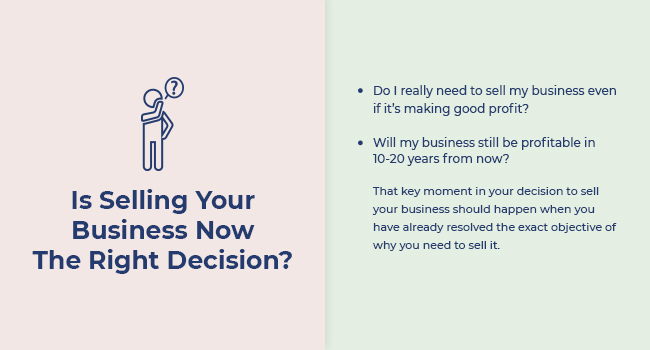
How do you determine the right time to sell your business? It’s not exactly rocket science determine when’s the right time to sell your business, since you need to rely on your instinct to determine the exact timing. The importance of decision may very well make you very rich – or very poor – depending on the timing.
Some of the most important questions you need to ask yourself are:
- Do I really need to sell my business even if it’s making good profit?
- Will my business still be profitable in 10-20 years from now?
Those two are probably the most important determining factors to consider if you’re thinking of selling your business. That key moment in your decision to sell your business should happen only when you have decided the objective of selling it. Following that, here are 10 good reasons why you may want to sell your business:
- While You’re Still Profitable.
- When You’re Afraid of Future Risks
- When You Find A More Lucrative Endeavor
- When You Can’t Maintain A Competitive Advantage
- When You Find It Hard To Emotionally Commit To Your Business
- When You Need A Change of Lifestyle
- When You Find It Hard To Handle The Tasks And Responsibilities
- When You Cannot Commit Wholeheartedly To Your Business
- When There’s A Very Good Offer For Your Business
- When You Need To Retire and There’s No One Else To Handle Your Business
To Sell Vs. Not To Sell

While selling your business as mentioned with the 10 reasons above may be good from a financial and logical point of view, you may also need to reconsider and explore why it may not be good to sell your business after all. Some of the reasons are:
-
You’re not Clear about What You’re Going to do if you Sell your Business
No matter how substantial the amount you got from selling your business, as long as you don’t have a clear idea of what you’re going to do next, you might find yourself in dire straits soon.
-
You’re Losing Money with your Business
Let’s face it: No buyer is willing to take the risk of buying a losing business, unless of course, you’re a major brand that’s recognized all over. The risk factor is just too great and you just have to find a way to turn your business around.
-
You’re in need of Immediate Cash
Maybe you’re in some sort of emergency situation where money needs to be dispensed fast. If you can help it, don’t be too hasty to sell your business. Chances are, most fast deals involve taking large cuts and enormous discounts. Unless you really need to have cash fast, it’s not good to underestimate the value of your business when selling.
-
When you Really Have no Plans of Selling
You’re business is doing good. You’re comfortable with your profit margin. You enjoy running your business. Why sell it? As long as you’re happy with how things are going with your business, there’s no good reason to sell it. Really.
When to Sell

Selling a business is not an easy decision to make. This is especially true when you’ve had your business for a while, and based on a lot of entrepreneurs’ experiences published online, the feeling of guilt and remorse linger long after the sale has been consummated. So given this situation, how do you really decide if now is the right time to sell or not?
You don’t have to look far to see what happened to one of the most promising search engine giants that was eventually trounced by Google: Yahoo! From its birth in 1995 to 2000, Yahoo’s venture capital rose from just $2 billion to a whopping $140 billion. Unfortunately, bad business decisions plus not-so-wise acquisitions ensured Yahoo’s ultimate decline.
In the early 2000’s , however, who would have thought that Yahoo would fall to such great depths? Sure, the dot-com bust put a dent to its earnings, but it was still a formidable tech company to reckon with. In fact, Microsoft tried to initiate a hostile buyout of Yahoo for $45 billion. That’s around $37 billion more than what Yahoo is currently worth. At that time, however, Yahoo’s CEO Jerry Yang thwarted Microsoft’s attempts to buy it out. You can just imagine how Microsoft may have felt now that the buyout didn’t push through.
Given Yahoo’s and other once-big businesses’ experiences, here are 10 signs that help you determine if you need to sell your business right now:
-
Your Business is Growing too Big to Handle
Handling a lot of responsibilities have you becoming too exhausted and depressed to function effectively.
-
A rival is Making you a Very Big Offer
How can you refuse an offer that’s beyond your expectations? You need to decide fast or your business may go the Yahoo way.
-
Your Business has Reached its Peak
You can tell your business has reached its peak by the way your sales has reached its highest point and evened out. While you may innovate to improve sales, you might run out of ideas and pull it down instead.
-
You have too Many Competitors for your Product/Service
The market has become saturated and it may be time to sell while you still have the edge.
-
You Ran Out of Ideas on How to Expand your Business
Yes, even the best entrepreneurs will have such moments, and instead of looking for ways to improve your business further, you may find it wise to just sell it off.
-
You’re not Happy Anymore With Where your Business is Headed
Think maybe it’s time to retire while your business is still profitable?
-
Your Business has Grown too Fast for you to Catch up
Let’s face it: Your company might need new leadership and somebody who has better ideas than you to make it even bigger.
-
A Shift in the Market is Affecting your Business
Has a new competitor with better and aggressive ideas emerged in your market? It may be time to sell your business before it’s too late.
-
An Opportunity Suddenly Arrives
Imagine the feeling if Facebook or Google suddenly comes knocking on your door and makes you a drool-worthy offer? Can you say no?
-
You need to Cash in on your Business and Need a Permanent Vacation
Your business is growing but your nerves are shot and you’ve hit rock-bottom. You probably need to enjoy life more and enjoy your money.
What You Can Expect When Selling Your Business

So you’re running a very profitable business that makes a lot of money. However, there may come along an unexpected circumstance wherein a person you met at a business fair or trade show suddenly pays you a visit or gives you a call to say he’s interested in your business. Before you ever decide to sell your business, there are a couple of things you need to consider. Here are 10 things you need to know before you sell your business:
-
It’s not a Swift Transaction
Some negotiations take months or even years to complete before a sale process gets completed.
-
Make Sure your Customer Base is Enough and Not Limited
A few loyal customers may be good, but if they make up the bulk of your sales, your buyer may become hesitant to buy your business since losing that base may spell disaster to his business.
-
Check your Financial Records
You need to coordinate with your accountant regarding ironing out the kinks in your finances so that the buyer will not be alarmed and hesitant to proceed with the purchase.
-
Take Care of your Business Until the Last Minute
While you may be tempted to start distancing yourself from your business, it’s essential that you take care of it until the last minute, otherwise, leaving prematurely may result in sudden sales drops, something you don’t need when you want to assure your buyer that your sales are stable.
-
Decide on the Right Time to Tell your Employees
You may want to talk to your managers and supervisors first and keep things confidential until the last minute. You don’t want your employees to be unnecessarily alarmed and lose morale.
-
Selling your Business May be Separate from Real Estate
If you own both, then you’ll have a bigger chance of commanding a higher sales price for your business together with the lot it’s sitting on.
-
Analyze the Potential Risks
You don’t want your buyer to be nervous and negotiate for a lower price when he sees signs of potential hazards in acquiring a business.
-
Be Wary When Choosing Between Buyers
When you have more than one buyer who’s interested, choose carefully by checking the background of each buyer. Know that the top offer may not be the best offer, especially if you want your legacy to continue in the business.
-
Be Emotionally Detached Little by Little
It’s hard to let go of a business that you’ve built from the ground up with your blood, sweat and tears. If you find it hard letting go, you may as well keep the business.
-
Prepare the Necessary Legal Documents to Protect your Business
A Non-Disclosure Agreement (NDA) is necessary so that your business will not be in jeopardy before the final sale transaction is done.
How To Sell Your Business

Selling your business may not be an easy task as there are a lot of hurdles to overcome. Here’s a step by step guide on how to sell your business:
-
Look For Potential Buyers
If you’re an established brand with a sizeable customer base, then you won’t have any problems putting your business out in the market. If your business is not that well known, however, it’s best to hire the services of a business broker.
-
Offer A Reasonable Price
You can gauge from businesses in your similar industry that have recently been sold to determine your own selling price. Either that, or you can use a value-based formula based on your sales and average earnings for each year.
Clearly Lay Out The Terms of the Sale. Let your potential buyer know if you need to be paid the total amount in a lump sum or if you’ll accept down payment and installment terms. Also, be clear what kind of assets are included in the deal, plus if your employees will be absorbed in the deal.
Determine The Tax Issue For The Sale. There are different tax categories for the kind of business you run, whether sole proprietorship, corporation, partnership or LLC. Have a professional accountant help you sort out your tax obligations.
-
File All Necessary Tax and Legal Documents
Selling a business entails a lot of legal documents like a Sales Agreement to cover all the details of the sale, as well as an asset Acquisition Statement for the IRS so as not to get entangled in legal complications.
-
And Finally, Prepare For The Closing
You may need to bring all the necessary papers and things needed for the handover to the new buyer. Make sure these are complete, by having a checklist on the necessary things that need to be done, before you walk out the door of your office for the last time.
To Hire Or Not To Hire A Business Broker : That Is The Question
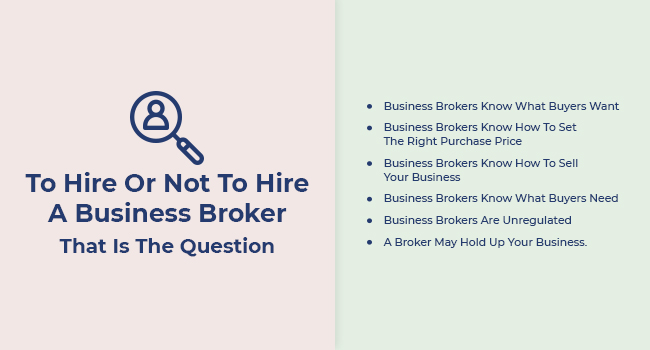
Deciding when and how to sell your business is only half the effort needed to make that into reality. You’ll need expert and professional advice, one who knows the course of the market and familiar with the highs and low of business, including the pricing when it comes to selling businesses and assets. For that, you’ll need a business broker.
So what are the advantages of getting a business broker? Here are some of the ways a broker can help you sell your business:
-
Business Brokers Know What Buyers Want
Having been in that area of expertise for quite a while gives business brokers the advantage of knowing what buyers want. Their invaluable experience will help you sell your business with the right timing at the right price.
-
Business Brokers Know How To Set The Right Purchase Price
Business brokers give you valuable advice especially if you set your price too high or too low, depending on the viability of your business and how attractive it is to buyers. Helping you gauge the right price will help prevent losses when you sell your business.
-
Business Brokers Know How To Sell Your Business
By hiring a business broker, he can help you market your business correctly and helps you find the correct buyer. There are a lot of potential buyers out there and helping you find the right buyer is crucial in getting what you exactly want from the sale of your business.
-
Business Brokers Know What Buyers Need
They know what’s relevant and what’s not and what buyers want, based on their experience. Helping you find the key points that buyers want help you tailor your business in such a way that it becomes very attractive to potential buyers.
Now that you know the advantages of getting a business broker, let’s explore the disadvantages of hiring a business broker:
-
Business Brokers Are Unregulated
This means there are a lot of incompetent brokers out there who really do not know what they’re doing, and that could be dangerous to your business. With no proper training and real licenses, you may fall into the wrong broker’s hands.
-
A Broker May Hold Up Your Business.
Not only will a potential broker be incompetent and inexperienced, he may also demand an exclusivity agreement which can tie up your business. You may end up regretting your decision to hire and would have been better off selling your business yourself
Hefty Commission Asking Price
Business brokers demand at least 20% commission. The bigger the deal, the bigger commission they’ll be getting.
Of course, not every business broker fits the descriptions above. There are really good, honest-to-goodness brokers out there who will work hard to give you what you need when selling your business. However, there are guide questions that can help you choose the right broker:
10 Questions To Ask A Business Broker When Selling Your Business

It’s always a good idea to have several business brokers you can choose from and these questions will help you choose the right one to represent your business when they’re selling to potential buyers:
- How long have you been selling in this business?
- How much is your clear assessment of my business and how much do you think is the value when I put it up for sale?
- Are you part of a network of professional brokers who are good in selling and can you show your credentials?
- What’s your strategy for marketing my business?
- Do you have active buyers in your list and what kind of business are they interested to buy?
- What are your plans for selling and how will you go about advertising my business?
- Can you put me on good online sites where my business gets exposure to a lot of buyers?
- Can you give me reports and updates on your activities related to the selling of my business?
- Can you give me an idea how you will screen and choose potential buyers?
- How much commission are you asking for and how will the fee structure be with the amount of the sale?
Different Options To Sell
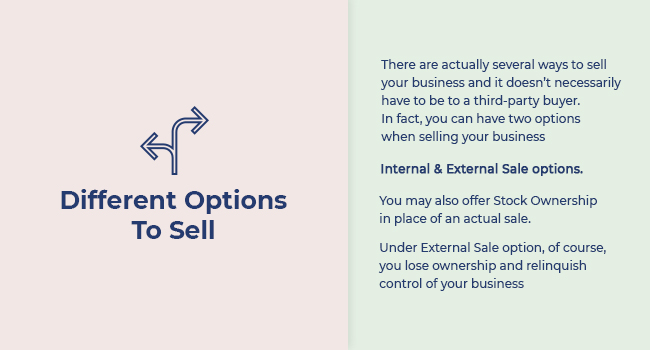
There are actually several ways to sell your business and it doesn’t necessarily have to be to a third-party buyer. In fact, you can have two options when selling your business: The Internal and External Sale options.
Under the Internal Sale option, you can let your own management or employees buy your business and internally transfer ownership, although at a lower price, but with a bigger net sale due to the elimination of taxes and other legal fees. You may also offer Stock Ownership in place of an actual sale. This way, employees feel responsible for how your business is being run because they’re now part owners of the business but you still retain control of your business as a whole.
Under External Sale option, of course, you lose ownership and relinquish control of your business after the sale, but you earn a considerable amount from selling your business.
Do’s and Don’ts When Selling Your Business

Selling your business requires a lot of paperwork and legal documentations. From multiple dealings with the buyer to determining the exact value of your business, here are the do’s and don’ts when selling your business:
Do’s
-
Know The Value of Your Business
Knowing the value of your business, not just in the financial aspect but in operations as well, will give you a direct understanding of the value of your business and price it accordingly.
-
Take The Advice of Professionals
These are your peers in business who are successful in their own businesses, your accountant, lawyers and investment bankers. Their valuable advice will come handy once you start negotiations for the sale of your business.
-
Plan The Process of Selling Ahead
Selling your business is not a decision made overnight. You have to plan through the process as long as two to three years before the actual sale. You have to review your financial statements and all necessary legal and financial documents.
-
Be Transparent To Potential Buyers
The age-old adage, “Honesty Is The Best Policy” still rings true especially when it comes to business transactions. Be upfront with potential buyers because they usually shy away once they notice anything amiss with your business. Better to tell them the real state of your business beforehand.
And here are the don’ts when selling your business to help you avoid mistakes other businesses do:
Don’ts
-
Rush The Sale
Always exercise due diligence and care when trying to sell your business. Buyers have a sort of sixth sense and are as intelligent as you when smelling out a business. When they see that you’re too much in a hurry, they’ll offer a lower price than what your business is actually worth. Don’t be too obvious and desperate for fast cash.
-
Try And Sell Your Business Alone
Like everything, there are professionals who can help you with your plan in selling your business. Business brokers, advisers and investment bankers all have sound advices that can help you maximize your advantage when selling your business.
-
Leave Your Family Out Of It
Family members are your closest supporters and the personal aspects of deciding such a big undertaking as selling a business could have an impact on your family members. It’s very important that you’re all on the same page with the decision to sell.
The Real Value Of Your Business +Tips and Steps To Evaluate Your Business
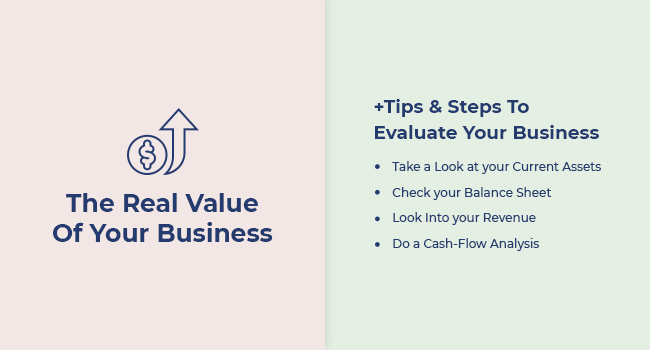
It’s very important that you really know the true value of your business. Unless you have other businesses going, the financial and personal impact of selling your business might affect your future for better or for worse. However, it’s not just personal welfare we need to consider here. If you plan to sell your business, you have to consider several things such as evaluating your business to know its worth to buyers by considering the following aspects:
-
Take a Look at your Current Assets
What equipment do you own and how many things are there in your inventory? It’s important that you get a real appraisal of your current inventory to get the true worth of your assets.
-
Check your Balance Sheet
Does your business have a good financial record? Having excellent sets of financial books can make your business very attractive to buyers. It means your business is quite profitable.
-
Look Into your Revenue
Having a steady stream of cash doesn’t necessarily mean your business is making a profit. There are overhead costs to consider and not all that stream goes into your pockets. The most important thing to consider is your business earnings. Earnings are more important than sales when it comes to consider the business’s financial health.
-
Do a Cash-Flow Analysis
You may need a financial adviser or your accountant to do this one since it’s quite complicated. Basically, it’s looking into how much money your business generates every year and calculate that based on the prevailing rate of the Treasury Bill or T-Bill.
Finding Buyers: How To Choose the Right Buyer

As indicated earlier in this article, unless your business is well known, you may have trouble selling it, unless it’s generating really good profits. Even if yours is a small business, as long as it’s solid and has a good customer base, you won’t have trouble attracting several buyers. That gives rise to another dilemma: If you have lots of buyers making offers, how do you choose the right one?
Here are tips on finding the right buyer:
-
Find a Buyer Who Offers Maximum Value for Your Business
He doesn’t have to be the one who makes the biggest offer. He’s just the one who recognizes your business for what it’s worth.
-
Choose the Buyer Who Knows the Value of Future Earnings
When talking to a potential buyer, listen to his plans and how he’ll ensure the business will grow further. If he cares about your company and its legacy, he’s the perfect buyer.
-
Look for one Who Knows the Company Inside Out
You may not need to look far when choosing the right buyer. Your offer may come from some of your customers themselves, a close competitor or even your employees and leadership team. Having a buyer who knows your business is better than one who’s a complete stranger.
The Types of Buyers You Come Across

Educating yourself on the types of buyers helps you choose the right one for your business. Here are the types of buyers you may come across when selling your business:
-
The Individual Buyer
Most individual buyers are self-made men who made their millions by working hard and rising from the bottom up. He knows what it’s like to be an employee, a supervisor and a manager, since in all likelihood, he’s been in all three positions. While he may have a good management resume and can ensure the structure of your business will continue, the downside is an individual buyer may not have the enough amount that you’re looking for in selling your business and he may have limited financing options.
-
The Strategic Buyer
A strategic buyer is one who’s quite adept at the workings in the market and industry as a whole. Chances are, he’s got a lot of businesses running and is looking at the acquisition of your business to strengthen his position in the industry. Most strategic buyers are looking to expand their presence in the market. Buying your business may mean a loss of identity, since it may be merged with his other businesses and the prevailing name which is dominant in the market may be used.
-
Equity Partners
Also known as financial buyers, are partner investors looking to cash in on strategically located businesses who have high yields of return. They may not necessarily purchase your business, but will cash in on it by investing on it. They have unlimited liquid assets and may initiate a hostile takeover of your company if need be.
Tips on Negotiating A Business Sale

You may have plenty of experience negotiating with suppliers and customers but how about negotiating with a buyer who’s interested in your business? It’s a totally different experience but not to worry, here are tips on negotiating a business sale:
-
Show Confidence and Assertion
Seasoned buyers are business-savvy and can tell a weakness when they see one. To them, you’re like a prey and will try to negotiate with your business in their own terms. Showing firmness will send a signal that you’re not one to be intimidated easily.
-
Be Prepared To Answer Every Query
Selling your business means you have to be prepared with any question the buyer may ask regarding your business. The buyer may ask the status of your earnings and the sale your business is making, its customer base, and the percentage of the market you’ve captured, among all queries.
-
Listen To Everything The Buyer Has To Say
Don’t do all the talking. You also need to hear out what the prospective buyer has to say about things like why he wants to buy a business and what type of business he would like to acquire.
-
Psychologize The Buyer
Silently analyzing a buyer helps you know if he’s bent on buying your business or just fishing around the market for lucrative deals. Oserve the buyer’s body movements and the words he use when he talks. It helps that you know the types of buyers mentioned earlier so you’ll get a general idea if he’s a serious buyer.
-
Develop Trust and Rapport
The sooner you develop trust and rapport with the buyer, the smoother the process of sale will be. Be able to develop a professional working relationship with your buyer so that every negotiation and paperwork will not encounter any setbacks.
-
Be Wary of Your Competitors
Some competitors act as buyers to get inside information about your business. Being able to distinguish between a real buyer and a competitor may be hard but you can tell the difference the longer you talk.
-
Avoid Giving Too Much Information Too Early
This is closely related to the preceding tip about being wary with the competition. While it’s necessary to provide information to a potential buyer, keep it to a minimum and only discuss the most sensitive details when you close the deal.
-
Radiate Positivity
Be optimistic and don’t look desperate when trying to sell your business to a potential buyer. Always remember there are lots of buyers out there and you’ll find the right one soon. Handle the situation like the professional that you are and answer every buyer’s question confidently.
-
Be Clear and Concise With Each Other
This is to prevent miscommunication and any misunderstanding, especially in your negotiation process. It’s always advisable to take notes and hear everything your buyer says.
-
Be Prepared To Walk Away
No doubt about it, negotiations can be tough, and it’s not always easy. If you think the deal is disadvantageous on your side and not according to what you need and expect, then prepare to walk away. There are always other buyers out there.
Exit Strategy and Documentation
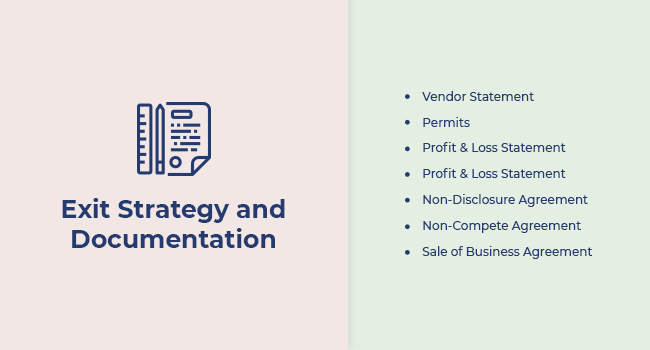
Selling your business means you need to have an exit strategy, particularly with liquidation and selling of assets. It’s good to cash in on your hard work but of course, there are a lot of things to prepare besides having an exit strategy. You need to take care of legal paperwork and documentation. Depending on the business situation, here’s a look at the necessary documents you may need to prepare:
-
Vendor Statement
Disclosure document that a seller needs to provide the buyer, specifically the property on which the business is located.
-
Permits
Business Permits, Health permits, Food and Liquor License (if applicable), etc.
An official summary of your business’s financial performance in monthly, quarterly and annual basis to look into its performance over time for comparative and accounting purposes.
Provides an overall financial health of the business including liquidity, assets and liabilities
It’s very important that in the course of your negotiation with the buyer that you have a confidentiality agreement to protect sensitive information from being shared to a third party.
When you finally leave your business in the hands of the new owner, it’s only logical that you sign a Non-Compete Agreement. This will ensure you will not be competing in the same business as the new owner at a defined period of time.
-
Sale of Business Agreement
This is probably the most comprehensive agreement that covers every aspect of the legal and commercial issues of your business. The complexity of this legal document means you may need legal advice as you go along with this agreement.
Checklist before Selling a Business

When selling your business, it’s essential that you don’t overlook important details for a smoother transition and time-saving effort for ease of transfer. While it’s impossible to produce a thorough business checklist that covers everything, this list will help you with some of the most important things to consider when selling your business:
For General Application
- Inventory of Assets
- Inventory of plants and equipment
- Accounts and financial statements (monthly/quarterly/annually) from the last 3 years
- Complete list of employees
- License copies of the following: (When Applicable)
- Software licenses
- Environmental compliance and waste disposal
- Food and Liquor License
- Health License
- Intellectual Property Rights (copyrights, patents,registered trademarks and designs)
- Copy of securities and collaterals
- Copies of bank arrangements and other transactions
- Copies of policies regarding employee contributions, contracts,salaries and pension policies
- Copies of all other licenses and policies
For Registered Companies and Limited Liability Partnerships
- Certificate of Incorporation
- Articles of Association
- Memorandum of Association
- Complete list of names and addresses of shareholders/ directors of the company and designated members including the company secretary
- Details of charges ( debentures/floating/fixed charges)
- Last Annual Return plus accounts and financial statements from the last 3 years
- Statutory books
Commercial Agreement Documents
- Purchase and Leasing Agreements
- Maintenance Agreements
- Copies of all other commercial agreements
Property Documents
- Lease copies
- Business rates
- Insurance policies
Mistakes to Avoid When Selling Your Business

Selling a business is a complicated process that’s never easy and can be a stressful and trying experience. Along the way, you are bound to make a couple of mistakes. This portion will give you an idea of the common mistakes that need to be avoided when selling your business:
-
Non Preparation
Be careful not to let your revenue fall while your business is still not sold. Preparing your business for sale means straightening out your finances and maintain sales stability so as not to affect the worth of your business.
-
Overvaluation
If you think your business is worth a lot, you don’t necessarily have to overvalue the price. Be realistic and get proper third-party valuation who can statistically present you the proper worth of your business.
-
Unwillingness To Engage Professionals
You may be a savvy businessman but selling your business is oftentimes a whole new experience. It’s best to hire the services of a business broker and a lawyer/accountant/investment banker to cover every base and maximize the value of your sale.
-
Relaxing
Just because you’ve signed a brokerage agreement doesn’t mean you have to sit back and relax while waiting for the business broker to bring a buyer. There’s no person greater motivated than you to sell your business if you really meant to.
-
Non-evaluation of Potential Buyers
Pre-qualification of potential buyers is important so you will know if the buyer is really interested to buy or just probing. Worse, the buyer may be sent by your competitor to spy around.
-
Exaggerating
Your buyer will find out sooner or later how your company is doing in terms of sales and financials. It’s best to be truthful to avoid legal complications and talk to your lawyer regarding what information to share with a buyer during the transaction process.
-
Not Determining The Price
Selling your business too high or too low a price can both have consequences. Better consult your accountant or investment manager to review your business’s worth before setting the right price for the sale of your business.
-
Expecting Cash Offers
Even the richest entrepreneur will not risk parting with a huge amount of cash in one go when buying anything, even a lucrative business. There’s financing involved and payment installments in the terms of payment.
-
Talking Too Much
It’s always best to maintain confidentiality to avoid drastic changes in sales and the morale of your employees. Market your business but keep it between you and your closest confidants in the meantime.
-
Not Discussing Transitional Issues
This should not be forgotten in the transaction process between you and the buyer. You and the buyer may agree to let you stay after the sale to ensure a clear transition process.
In Summary

In coming across such a long guide on how to sell your business, you may be overwhelmed by the many things to consider. After all, this is a complete guide and nothing is being left out to give you the most comprehensive guide possible. To make it easy for you, here’s a step by step summary on the tips for selling your business
-
Do A Market Research
Know the position of your business in the market to gauge its viability to prospective buyers.
-
Research The Competition
It doesn’t hurt to research your closest competitors to make a comparison how they’re doing compared to your business.
-
Keep Up With Technology
Modernize your plant, upgrade your equipment and invest in the latest software to impress your buyer when he comes to check on your facilities.
-
Make Sure Your Location Is Ideal
Location is everything. The more strategically located you are, the more attractive your business is to buyers. And finally,
-
Make Your Business Very Attractive To Buyers
Making your business irresistible to buyers will ensure you’ll get a better offer. Organize your financials and improve your sales so your business will be irresistible to buyers.
Selling a business is a complicated process but when you’re armed with the correct and comprehensive guide on the proper way to do so, you’ll have no trouble at all making the right moves and decisions.
All the Best 🙂
